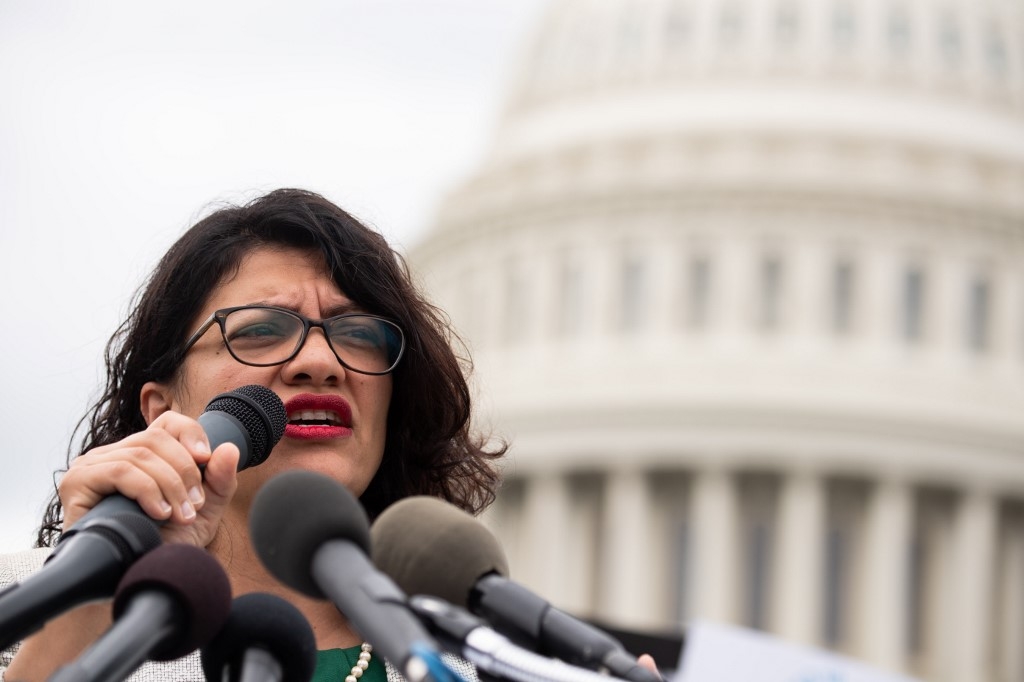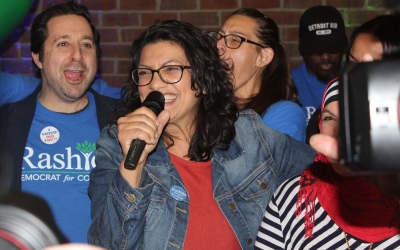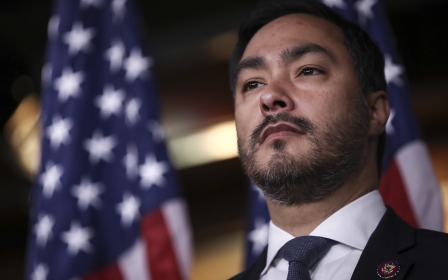Five initiatives backed by Rashida Tlaib that changed Detroit

Rashida Tlaib made history in 2018 as one of the first two Muslim women to be elected to Congress despite running at a time of heightened Islamophobia.
On Tuesday, she's up for re-election in Michigan's 13th district - facing challenger Brenda Jones, Detroit's Council President, who she defeated by just one percent in her last primary.
Tlaib, who is unapologetically Palestinian and progressive, has made headlines for loudly opposing US President Donald Trump's domestic policies and challenging the powerful pro-Israel lobby.
Taking aim at the status quo alongside three other first-term congresswomen of colour who make up "the squad" - she has irked both the Republican party (GOP) and elements within her own Democratic party.
Jones has insinuated that Tlaib - who has a nationwide following unusual for a freshman congresswoman - seeks to be "a rock star", as opposed to a serious legislator.
But many of her achievements as representative to the nation's third poorest House district don't seem to have gone unnoticed with voters ahead of the primary.
Her initiatives, including her sponsorship of 27 House bills, have seen her popularity spike, with Tlaib leading Jones by about 30 percentage points.
US House Speaker Nancy Pelosi, who has tangled with Tlaib in the past, has also rallied around her, calling the incumbent a "tireless advocate for the residents of Michigan's 13th Congressional District."
"Rep Tlaib never stops fighting for her district, which she is proud to represent. And I am proud to endorse her for re-election," Pelosi said.
Ahead of the vote, Middle East Eye has taken a look at Tlaib's record and some of the initiatives she has pushed during her time in office.
1. Tlaib opens neighbourhood service centres to address constituent needs
During the past two years, Tlaib has opened four neighbourhood service centres in the district that offer a variety of resources and programmes, such as free legal services, food assistance to low-income seniors and free tax preparation.
The centres also work as a liaison between her constituents and other government agencies, such as the Social Security Administration, Veterans Administration (VA) and Federal Student Aid office.
"The creation of the Neighborhood Service Centers throughout the district will change people's lives today," Tlaib tweeted last year, saying she could not wait "for residents to feel the change".
The centres also help residents access state emergency relief funds, secure government home repair and weatherisation grants, find free health care services and avoid home utility cuts - among other initiatives.
2. Introduces amendment to prevent Trump from sending troops to Detroit
On 31 July, the House passed an amendment introduced by Tlaib as well as representatives Ted Lieu, Alexandria Ocasio-Cortez, Deb Haaland and Emanuel Cleaver, which would "directly impact the federal government's ongoing interference" in US cities, including Detroit.
Following nationwide unrest sparked by the killing of George Floyd, an unarmed Black man asphyxiated by police in Minneapolis earlier this year, US President Donald Trump sought to quell popular protests through "Operation Legend", which has seen officers from the Federal Bureau of Prisons; Bureau of Alcohol, Tobacco, Firearms and Explosives; the FBI and US Marshals Service, among others, crackdown on demonstrators.
Tlaib and other lawmakers passed a bill last month that would end the operations.
The passage of the bill came two days after Detroit US Attorney Matthew Schneider announced that dozens of federal agents were being assigned to Detroit to "root out violent criminals".
"Operation Legend and Operation Relentless Pursuit are a continuation of the same disgraced tough on crime policies that have failed to keep our communities safe while disproportionately locking up Black and brown people," Congresswoman Tlaib said in a news release announcing the amendment's passing.
"Many communities in my district have been systematically over-policed, and at a time when trust is low and people are crying out for justice, the presence of unidentified federal agents in our neighbourhoods only serves to escalate conflict that will disproportionately harm our neighbours of color. I am proud to cosponsor this amendment to defund this blatant attempt to sow fear and division in order to save the President’s poll numbers."
3. Tlaib introduces legislation to ban water shutoffs during pandemic
In April, along with Michigan congresswoman Debbie Dingell, Tlaib introduced legislation seeking to prohibit water shutoffs and ensure water affordability for low-income households during the coronavirus pandemic.
According to the bill, around 15 million people in the United States have experienced water shutoffs at some point. With the Center for Disease Control (CDC) saying that one of the most effective ways to prevent the spread of Covid-19 is handwashing, the congresswomen has pushed for water access in every American household.
"At the onset of the Covid-19 crisis, around 2,800 families in Detroit had no running water," Congresswoman Tlaib said in a news release announcing the bill. "Now they and many more across my district and Michigan are being forced to face it without the ability to wash their hands and help safeguard themselves and their loved ones from this virus."
"Water has become more and more unaffordable, inaccessible and contaminated because we are not prioritising the critical importance of water being a human right. The barriers and continued lack of investment are components of increased poverty and structural racism that many in our community have been facing their whole lives. This crisis provides renewed urgency for dismantling these broken systems and ensuring that water is a human right."
4. House passes Tlaib's amendment requiring replacement of lead water pipes
Last month the House passed an amendment introduced by congresswoman Tlaib that would authorise $22.5 bn over five years for full lead pipe replacement. The amendment prioritises low-income communities like those in Tlaib's 13th district. It passed with bi-partisan support in a vote of 240-181.
Around 5.5 million Americans get their water from systems that exceed the Environmental Protection Agency’s (EPA) lead action level of 15 parts per billion, according to a 2018 report from the Natural Resources Defense Council (NRDC).
The threat of lead-contaminated water has for decades disproportionately affected low-income communities and communities of colour, Tlaib's office said in a statement announcing the bill's passage.
"Water is a human right and our amendment passed today is a huge step toward making that so by delivering the clean drinking water that every person - in Michigan and beyond - deserves," Congresswoman Tlaib said.
Her amendment "ensures that there are no half measures and that the over nine million homes currently at risk of lead exposure get the full lead pipe replacement we owe them", she said.
"I am proud to have more than 100 environmental justice and community groups stand in support of this commitment to spend $22.5 billion over the next five years to keep our residents safe and clean water flowing.”
5. Tlaib spearheads bill seeking to prevent car insurance discrimination
Car insurance is legally required for all drivers in the United States, with the exception of those in New Hampshire and Virginia. But insurance companies often use income, education levels, gender, marital status and other unrelated factors to determine an individual's rates and eligibility to access coverage.
Tlaib's bill, introduced last year and referred to the House Committee on Financial Services, seeks to ensure that only driving records are taken into account when deciding rates and eligibility, preventing insurance companies from discrimination against low-income individuals, non-homeowners and others who otherwise have good driving records.
The congresswoman chose to tackle the issue because people in her district have "some of the highest car insurance rates in the nation", she said in a statement about the bill.
"Auto insurance rates should be determined by your driving record, not your credit score, gender, marital status, education, residence, or any other non-driving factor that has nothing to do with your safety on the roads," Tlaib said.
"Non-driving factors that serve as proxies for race and income and allow modern-day redlining are a main culprit" behind such high rates, she said.
Middle East Eye delivers independent and unrivalled coverage and analysis of the Middle East, North Africa and beyond. To learn more about republishing this content and the associated fees, please fill out this form. More about MEE can be found here.





